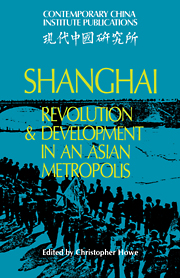Book contents
- Frontmatter
- Contents
- List of illustrations
- Preface
- Foreword
- Abbreviations
- PART ONE THE MODERN HISTORICAL PERSPECTIVE
- PART TWO POLITICAL LIFE
- PART THREE ECONOMIC DEVELOPMENT AND LIVING-STANDARDS
- PART FOUR THE SUBURBAN TRANSFORMATION
- PART FIVE CULTURE AND IDEOLOGY
- 11 The emergence of ‘worker-writers’ in Shanghai
- 12 Study and Criticism: the voice of Shanghai radicalism
- Notes
- A chronology of modern Shanghai, 1842–1979
- Contributors
- Index
12 - Study and Criticism: the voice of Shanghai radicalism
Published online by Cambridge University Press: 14 October 2009
- Frontmatter
- Contents
- List of illustrations
- Preface
- Foreword
- Abbreviations
- PART ONE THE MODERN HISTORICAL PERSPECTIVE
- PART TWO POLITICAL LIFE
- PART THREE ECONOMIC DEVELOPMENT AND LIVING-STANDARDS
- PART FOUR THE SUBURBAN TRANSFORMATION
- PART FIVE CULTURE AND IDEOLOGY
- 11 The emergence of ‘worker-writers’ in Shanghai
- 12 Study and Criticism: the voice of Shanghai radicalism
- Notes
- A chronology of modern Shanghai, 1842–1979
- Contributors
- Index
Summary
INTRODUCTION
Study and Criticism (Hsüeh-hsiyüi p'i-p'an) was the most influential journal published in Shanghai during Mao Tse-tung's last years. The purpose of this chapter is to examine the part it played in Chinese politics during that troubled period in which rival elites jockeyed for position as the Succession Crisis unfolded.
From its first appearance on 15 September 1973, Study and Criticism (hereafter SAC) aroused considerable interest in China and abroad. At that time few journals were being published as the Cultural Revolution had forced the closure of the major periodicals of the sixties such as Historical Research (Li-shih Yen-chiu), Philosophical Research (Che-hsüeh Yenchiu) and New Construction (Hsin Chien-she). Consequently, SAC promised to be an exciting new source which, according to a note for readers in its inaugural issue, would devote itself each month to matters of philosophy and social science, ‘study and sum up the rich experience of the socialist revolution’, ‘criticize revisionism and the bourgeoisie’, and generally contribute both to culture and to the consolidation of the dictatorship of the proletariat. Ironically, in the light of what has since transpired, it invoked the slogan of letting ‘one hundred schools contend’ and pledged itself to stimulating academic debate.
Ostensibly SAC was the organ of Futan, one of China's most prestigious universities. But its Shanghaiese provenance, its appearance a few days after the Tenth National Party Congress, and its format and contents suggested strongly that this was no ordinary ‘university journal’ (ta-hsüeh hsüeh-pao).
- Type
- Chapter
- Information
- ShanghaiRevolution and Development in an Asian Metropolis, pp. 326 - 347Publisher: Cambridge University PressPrint publication year: 1981



